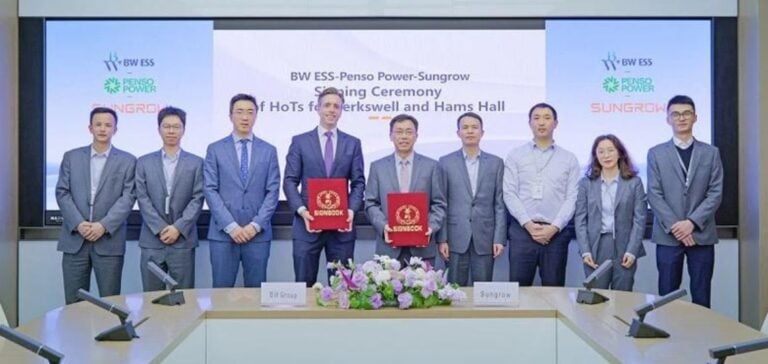Sungrow signs an agreement with Penso Power and BW ESS to supply 1.4 GWh of energy storage systems to the Hams Hall project in central England.
This partnership is designed to meet the growing need for flexibility and stability in the UK electricity grid, as it adapts to an increasing share of intermittent renewable sources.
The deployment of these new-generation storage solutions comes at a time when managing grid stability is becoming a critical challenge for the country, due to the reduction in grid inertia caused by the gradual closure of fossil-fuel power stations.
The PowerTitan 2.0 systems supplied under this agreement are specially designed for rapid response to grid fluctuations.
They enable efficient management of frequency and voltage imbalances, providing essential support to grid operators in maintaining continuity of electricity supply in an increasingly diverse power generation environment.
Grid-forming storage technology: the answer to today’s challenges
The PowerTitan 2.0 storage systems deployed at the Hams Hall project use advanced liquid cooling technology, increasing efficiency and equipment life.
Featuring black start capabilities, these systems enable rapid restoration of power in the event of grid disconnection.
Their ability to provide fast, accurate inertial support improves network resilience against sudden disturbances.
The technical features of these systems offer dynamic stabilization, which is essential for grids with a high proportion of renewable energy sources.
By reducing oscillations and controlling voltage variations on a microsecond scale, these installations provide a concrete solution to the challenges posed by the UK’s energy transition.
They also enable storage facilities to participate more effectively in the ancillary services market, a fast-growing segment in the country.
Impact on the UK ancillary services market
The development of projects such as Hams Hall demonstrates the rapid evolution of the ancillary services market, which is becoming increasingly essential for managing grid stability.
Grid-forming storage technologies, such as those implemented by Sungrow, play a pivotal role in the provision of grid support services.
These systems compensate for the drop in inertia caused by the phasing out of conventional power plants, helping to stabilize frequency and maintain power supply quality.
Erik Strømsø, head of BW ESS, speaks of the importance of innovation and collaboration in maximizing the efficiency of storage projects.
Highlighting past successes with Sungrow projects in Sweden and the UK, he emphasizes the importance of relying on the best available technologies to meet the complex needs of modern grid management.
Challenges and prospects for the energy sector
The agreement between Sungrow, Penso Power and BW ESS for the Hams Hall project highlights the growing interest in large-scale energy storage solutions capable of supporting grids in transition.
Operators and investors are looking to strengthen the resilience of electricity infrastructures in the face of the challenges posed by the integration of renewable energies.
As one of Europe’s key energy markets, the UK continues to develop its storage capacity to meet the demands for flexibility and stability.
The Hams Hall project reflects a wider trend towards the adoption of grid-forming storage solutions.
These technologies provide a technical response to today’s grid management challenges, and point the way for future investment in systems capable of meeting increasingly complex and dynamic energy needs.
By enhancing the grid’s ability to absorb fluctuations and respond to disturbances, these solutions are becoming indispensable for advanced energy markets.





















